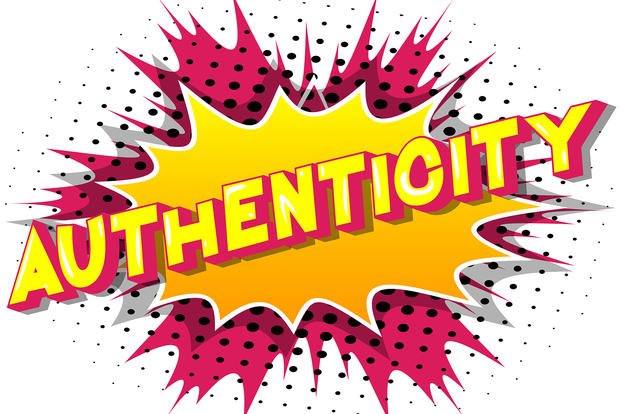From the time we are young, we are encouraged to get along and fit in with others. Even my parents, European immigrants, were told to assimilate as quickly as possible into American culture to be accepted.
A military culture, in particular, rewards sameness. For military personnel, being authentic poses many challenges. In service, you are taught survival skills, including cooperation, following orders and, yes, assimilation. The U.S. military supports sameness over individuality to ensure survival of the troops and mission.
However, in a society and culture that seem to reward sameness, we often lose the most valuable part of our personal brand: our authenticity.
As a personal branding specialist, author and speaker, my job is to help my clients and audiences create effective positioning based on their authentic value and contribution. My job is to help senior business professionals understand and express their authenticity in the world to build a more powerful, effective reputation.
In addition to working with corporate audiences, I work extensively with military veterans transitioning to civilian careers. Here is some of the advice I offer groups when I present programs to military members in transition:
Authenticity Explained
I define authenticity as "living the core goals, beliefs and values that guide your emotional, spiritual and intellectual self and that present through behavior." In other words, when you are your most genuine self, you are being authentic.
When we encounter you, are you being authentic? Are you representing yourself as you or as someone you think we'll like? Being authentic means that across situations, I will experience you -- and your commitment to your values -- consistently.
Since a brand is a promise of an experience, an authentic brand is one that has a consistent, dependable experience attached. Each time I experience you, I know I can expect you to be yourself (i.e., qualities such as friendly, honest, collaborative, inquisitive, etc.); I don't have to worry that you will try to be someone you're not just to impress me.
A Real Example
Earlier this year, I worked with a former Top Gun pilot who'd spent the past 20 years as an entrepreneur and innovator in the energy sector. John had been instrumental in designing, negotiating and directing large teams and was lauded for his financial acumen, innovation, teamwork, shareholder management and board management.
When I worked with John (not his real name), he was carefully scripted. He had spent years being coached by public relations teams and executive coaches, all giving him well-crafted key messages. His presentation skills had been honed over many years of public exposure.
At the time I worked with John, he was transitioning out of his role as CEO of a startup energy company, poised for success and growth. This presented a unique time in his life: No longer would his messages be prepared for him. He was on his own now.
Our work together revealed many "ah ha's," as well as confirmed some beliefs. John was great at building teams. He loved to mentor young people who were passionate about the energy industry. He reflected back (often) on his career as a Top Gun pilot -- what it meant to have others trust him with their lives, how it felt to go "off radar" and rely on training and instinct.
His military experience was part of his passion, his DNA and his motivation. He believed passionately in transparency and honesty. These authentic passions, character traits and beliefs gave John and me a platform from which to design his personal brand strategy and create the next chapter in his personal and professional life.
We designed a personal brand strategy and tactical plan that John found easy to implement, because it was based on his authenticity. For once, John could go off the script and be himself, and that was exciting to him.
Authenticity Isn't Easy
To uncover your authentic self, here are some helpful tips:
- Reflect on your passions. What do you enjoy doing? What do you love to talk about? What makes your heart race with excitement as you reflect on it?
- When do you feel "inauthentic"? When do you find yourself not acting like yourself, going through the motions, trying to be someone else? Is there a pattern to this behavior?
- Who do you enjoy being with? Adults? Children? Creative types or more analytical people? When do you feel most "like you"?
- What feedback is most positive? When you reflect on feedback you've received, what makes you happiest? Is it a comment like, "You're always on time"? Or, "You have such respect for our company protocol -- showing up on time shows us you care about the company"? Look for other examples of times you have shared this same behavior; did you get similarly positive feedback?
- Design your legacy. At the end of your life, when those left behind reflect on your contribution to your community, company, team and society, what do you want them to say was your legacy? What difference did you make? Did you live authentically and let people know what you value and believe?
Start Your Authenticity Today
Authenticity requires great introspection and humility. No one is perfect; we are all flawed. We also cannot turn back the clock and undo mistakes (or inauthentic behaviors) from the past.
We, however, can move forward and make changes right now to live more authentically. Focus on being genuine. Stop listening to the scripts of what you should do/believe/want/love/think, and listen to that quiet voice in your heart that knows what is right for you, above all.
Find the Right Veteran Job
Whether you want to polish your resume, find veteran job fairs in your area or connect with employers looking to hire veterans, Military.com can help. Subscribe to Military.com to have job postings, guides and advice, and more delivered directly to your inbox.












